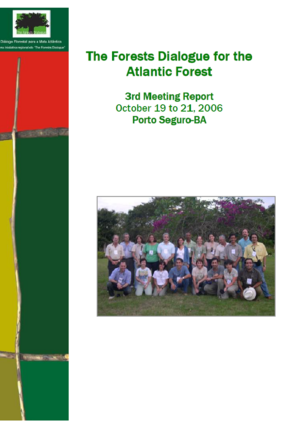Final Report : Third Regional Dialogue on Forests and Biodiversity Conservation
In October 2003 thirty stakeholders came together in Santa Cruz de Cabralia, Brazil, for a dialogue convened by THE FORESTS DIALOGUE (TFD). The focus of the discussion was on forestry and biodiversity conservation. The meeting provided an opportunity for members of environmental groups, the forests products industry, landowner groups, and academia to exchange information and ideas on the key factors needed to achieve successful biodiversity conservation and business outcomes in forest regions.
The positive outcomes of this first meeting inspired three Brazilian Non Governmental Organizations and three companies from the forest sector – Instituto BioAtlântica (IBio), The Nature Conservancy of Brasil (TNC), Conservação Internacional do Brasil (CI), Rigesa/MeadWestvaco, Suzano Papel e Celulose and Veracel Celulose – to further develop the Dialogue by integrating other regional players into the process and by focusing on the development of a shared concept for the forest sector and other stakeholders regarding the conservation of biological diversity in the Atlantic Forest. This proposal was well received by the TFD Steering Committee, which added the initiative to the TFD agenda and is giving full support to the Brazilian initiative.
Most of the forest companies that operate in the Atlantic Forest region, and particularly those from the pulp & paper sector, develop reforestation projects and promote biological diversity conservation and monitoring of the species located within their properties. Nevertheless, the level of cooperation between the companies and conservationist bodies is still very limited. Both groups agree that, to ensure the survival of the Atlantic Forest, it is necessary to broaden the efforts through the development of common agendas and by establishing partnerships.
TFD Brazil was created in order to aid the development of practical and economically viable activities for both the conservation of the biological diversity in priority areas and the improvement of the companies’ businesses. This initiative aims at integrating the pulp & paper companies and conservationist bodies which have operations and activities within the Atlantic Forest, one of the most important biomes on the planet in terms of biological diversity.
The goal of the first phase of The Forests Dialogue for the Atlantic Forest, which is taking place between 2005-2007, is to construct a common vision between forests companies’ environmental entities. This vision will bring concrete results and consequently broaden the scale of the conservation effort, thereby yielding tangible benefits for biological diversity and for the companies that participate.
The first phase of The FORESTS DIALOGUE FOR THE ATLANTIC FOREST was designed to promote four gatherings, each in a different part of the Atlantic Forest. The first one took place in October 2005 in Teresópolis (RJ), when the first steps were taken towards the promotion of discussing both opportunities and expectations, and the possibilities for joint action involving the two groups. At this first gathering, two central themes for immediate action were defined – incentives to tree farmers and territorial planning – and a coordinating group was set up for each, with the task of designing an action plan.
The final reports for the first and second meetings can be accessed at http://research.yale.edu/gisf/tfd/biodiversity.html. This document outlines the activities of the third meeting, which took place at a hotel conference room in the city of Porto Seguro, situated in Southern Bahia, and at the RPPN Estação Veracel, the largest private conservation unit of the Atlantic Forest.

